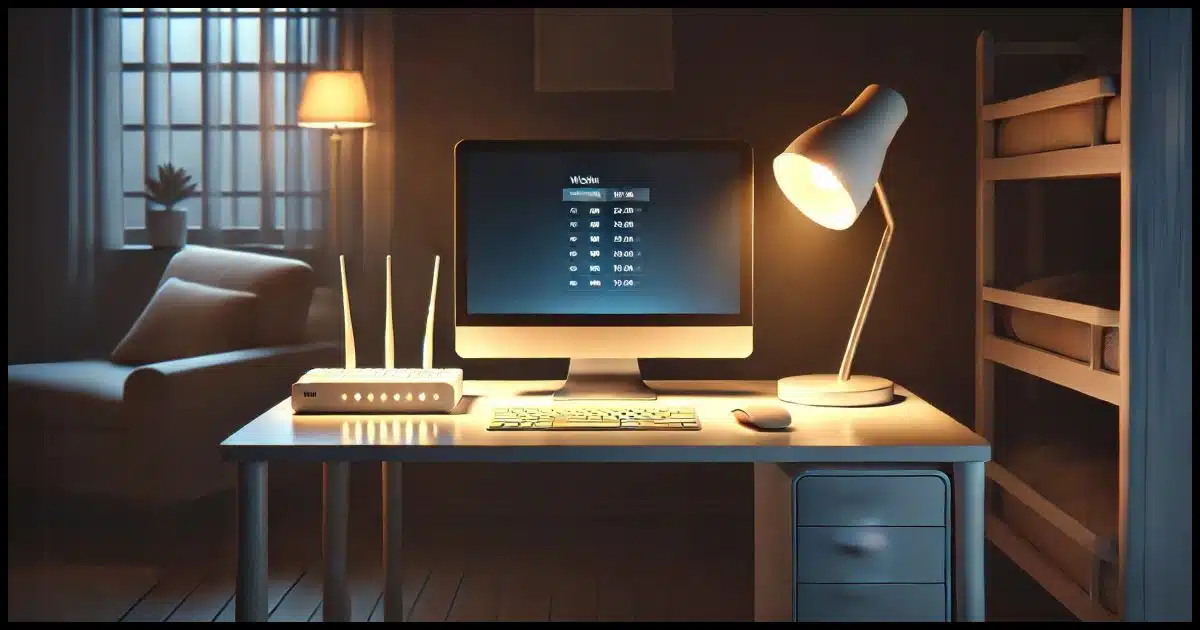Technically, yes, a teeny tiny bit. Pragmatically? It’s not worth considering.

My article on turning your computer off overnight frequently prompts people to ask if (or emphatically state that) turning off your computer keeps it safer from being hacked.
While the answer is “yes” if you want to be pedantic about it, the more practical answer is “no”.
Let me explain how you’re protected by 1) your computer and 2) yourself.

Turning off the computer for hackers
Turning off your computer overnight doesn’t significantly increase safety from hacking. Your NAT router already blocks unsolicited connections. Malware risks arise from user actions, like opening unsafe attachments. Focus on practicing safe computing and keeping your system malware-free. Leave your computer on or off overnight based on convenience and power concerns rather than worries about hacking.
You are protected by your router
Here’s the thing: a random program out on the internet cannot connect to your computer on its own. Period. A side effect of the way your router handles internet addressing — sharing your internet IP address among all the devices you have connected — prevents unsolicited incoming connections.
A computer connected directly to the internet1 is at high risk. There are stories of such computers being infected with malware within moments of being connected. It’s one reason I say we are all under constant attack.
A computer behind a Network Address Translation (NAT) router is safe from these incursions. Period. Day or night. Running or not. Chances are you already have one, and if you have more than one device connected to the internet, you almost certainly do.
Help keep it going by becoming a Patron.
Things that look like incoming connections aren’t
You might be wondering, then, how tools like messaging programs, file sync programs, or even email programs on your computer get notified when there’s something they need to do. Someone’s trying to send you a message, a file has been updated in the cloud and needs to be downloaded, an email has been sent to you, and so on, and your computer needs to act on it.
Those services are not connecting to your computer.
They use a “man on the inside”: the software installed on your machine that deals with those services.
Your computer initiates the conversation by reaching out to the messaging service, the cloud storage service, the email service, or whatever else. It might periodically check if there’s something new (like email), or it might have created a conversation when the program was first run on your PC and kept that conversation going continuously so the app on your computer and the service online can talk to each other when needed.
But the connection is never2 initiated from the internet. It’s always your computer reaching out.
Always.
You’re protected by… you
If the only things that show up on your computer are things the computer asks for, that means these things come from one of exactly two places:
- The software running on your machine. (Windows updates, mail programs, cloud sync programs, and so on.)
- You.
The second is where malware comes from. In fact, the most common cause of malware infections is probably people opening attachments they shouldn’t.
You, of course, practice safe computing. You know not to do that.
Pedants’ corner
There is a sliver of accuracy regarding turning off your computer and how it keeps you “safer”. When you turn it off:
- You’re not using it. If you’re not using it, you won’t open malicious attachments or do other things that result in your machine being compromised.
- Malware already on your machine will not run.
It’s the second one that causes most people the most concern. If your machine is infected with malware and software on your machine can “reach out” and download more malicious stuff, then turning off the machine will prevent an existing infection from getting worse.
But for that to matter means you already have malware on your machine! Turning off your machine won’t do anything about that; it’ll still be there when you turn it back on. The very thing you’re trying to prevent by turning off the machine has already affected you.
Focus instead on keeping yourself malware-free to begin with.
Do this
You don’t need to factor “getting hacked” into deciding whether or not you leave your machine running overnight. The chances are infinitesimal. Base your decision on the other factors that matter, like power usage or allowing automated processes to run overnight.
And, of course, do all the things we harp on to keep your computer safe as you’re using it.
Subscribe to Confident Computing! Less frustration and more confidence, solutions, answers, and tips in your inbox every week.






This comment of mine may come under the words oft quoted by Leo “You are just not that interesting” but we switch off our computer at night and if going out, on the premise that we are then signed out of Windows and the password vault. Heaven forbid our home is entered unlawfully, but we consider ourselves ready for the possibility.
Your thoughts would be welcomed on this action we take.
When you leave your computer unattended, you should lock your computer + L.
+ L.
This offers protection similar to turning the machine off. In fact, even if your computer is off a thief can boot your computer up from a live Linux or Windows live boot disk, or even take the drive out of the computer.
Encryption protects against that.
Over MANY years in the “computer industry” I have found hard drives that are never shut down never suffer from “stiction”, but if your power settings allow the drive to “power down” when not in use you may as well shut it down. Mine runs 24/7 except if I shut it down to physically clean it (blow dust out of fans/heat sinks, etc.) once or twice a year. Fans are the same. Power consumption? The computer and on-line UPS just help keep my (basement) office warm!!
My comment above has nothing to do with stiction or hard drive care. It’s about how to protect against hackers. I suggested locking your computer in response to the comment suggesting shutting down. Shutting down offers a tiny bit more protection than locking the screen, but it’s not worth it in most cases, and you definitely want to lock it it if you step away from the machine if there are other people in the house or office building. You’re not even always safe if you are with your family. The son of a woman I know used to get into her Facebook account and publish embarrassing things. Benign, but the potential for trouble is there.
Turning off your computer is not about being hacked, power usage or lightening protection. It’s about Windows. If you don’t reboot Windows every-so-often (assuming that Fast Start garbage is disabled) it will self destruct, or an update will change all your drivers and you’ll wake up to a nasty surprise the next morning. But the ultimate answer to this issue is that there is no right answer to it. It’s akin to politics and religion in computerese. It keeps coming up again and again and people debate it for amusement. See the comments in the YouTube version of this article.
Indeed. My answer is “it depends”, but there are those who are adamant that their opinion is the one and only true solution. ¯\_(ツ)_/¯
I restart when it “feels” like the computer needs it. If it gets a little flaky or sluggish, for example. Otherwise with OS updates and program updates that require a restart, I rarely have to restart due to problems.
Leo, no sarcasm here, but I admire the way you write for those of us who aren’t IT professionals.
My computer is not doing anything at night, so I see no reason to leave it on.
So run BOINC (formerly SETI) and contribute your unused computer power to scientific research!
I’ve been doing this for over 20 years now, through several computer upgrades. It’s a way I can participate in all kinds of research that is way beyond my own level.
True, it uses up some electricity. But that just warms up my house (it’s -27ºF today), and I figure switching to more efficient light bulbs more than makes up that electricity.
I don’t see any reason to leave the computer on all night long either.
Being in the Digital Music Studio Recording Business, we use a variety of Customized Gaming Desktops and Laptops running on Windows based Platforms that are Custom Optimized for high performance. Along with very fast processors and at PSU’s rated at 500-Watts along with quality UPS units to match correctly total Wattage Output of our many hardware rack gear devices. Premium Rack Power Conditioners for 20 Amp draw to match our building circuit breaker Panels as well. That’s a lot of generated heat to keep gear cooled down to work efficiently.
►
We find sleep mode [and programming it accordingly] to be highly effective as we may choose to shut down other external devices at quitting time, etc. This helps to keep all PSU Fans running at bare minimum until wake up time. On these Win Platforms, we DO browser connect to the internet in order to buy, update or install newly purchased software pertinent to Music Digital Recording. But, when recording, we -X- out of browsers completely in order to work in “stand alone mode” [which alleviates pop ups, banners and other online interference’s].
►
In closing, we do not use 3rd Party Anti-Virus or PC Clean up APPS. Microsoft’s built-in Defender and good Disk Cleanup and scheduled defragment procedures is more than enough to get the job done [without wasting hard earned money on the many marketing gimmicks that are out there].
Thanks for reading!
/MH~
I’m a retired senior citizen, and I have a desktop PC and two laptops. All three computers run 24/7, and idle down when not in use, but I configure them all to keep all drives and other peripherals from powering off when idle.
For security purposes, I have my ISP-provided router configured to ignore all incoming connection requests, so it’s effectively invisible on the Internet. My home Wi-Fi’s configured with WPA2-Personal, so only devices that know my Wi-Fi password have access to connect, and I NEVER share my Wi-Fi password with anyone.
Even though I practice safe computing, I know that I can slip-up, and contract malware, so I keep all my important data/files off-site, in the cloud. I back-up all three computers using the free edition of Macrium Reflect (downloadable from Older Geeks-dot-com). I keep my computers and installed software as up to date as possible using Windows update for the system and Patch my PC for my installed software, on a regular weekly schedule, and I keep a copy of the UEFI firmware for all three computers on a USB drive in the event I contract an advanced type of malware. I also keep a copy of the installation media for the versions of Windows I’m currently using on all three computers. My thinking is that if I’m prepared for the worst-case scenario I can imagine, if/when it happens, I’ll be facing an inconvenience, not a disaster.
Ernie
No need to obscure a link. We moderate all articles with live links and obscured links. If we trust the link, we leave it in. If we’re not sure, we remove it.
Macrium Reflect FREE Edition
A few weeks ago, you had an article on how to download Google One. I did that and my computer is running extremely slow and in some cases I cannot bring up a program. What is my problem and what can I do? If I uninstall Google One will that take all my files away?
I’m confused. Google One isn’t something you download. It’s just their brand for storage. What, exactly, did you download and install
I always shut down my computer when I’m not using it, and I can’t get back into it without typing my secret code. Is that the same as locking my computer? Sorry to ask a “duh” question like this, but at age 86 I still have a lot to learn.
It’s not the same but it’s essentially just as safe. Turning the machine off ads an insignificant security advantage. And considering that tuning it off offers little security advantage, sleep is a fine option. That’s what I do most of the time.